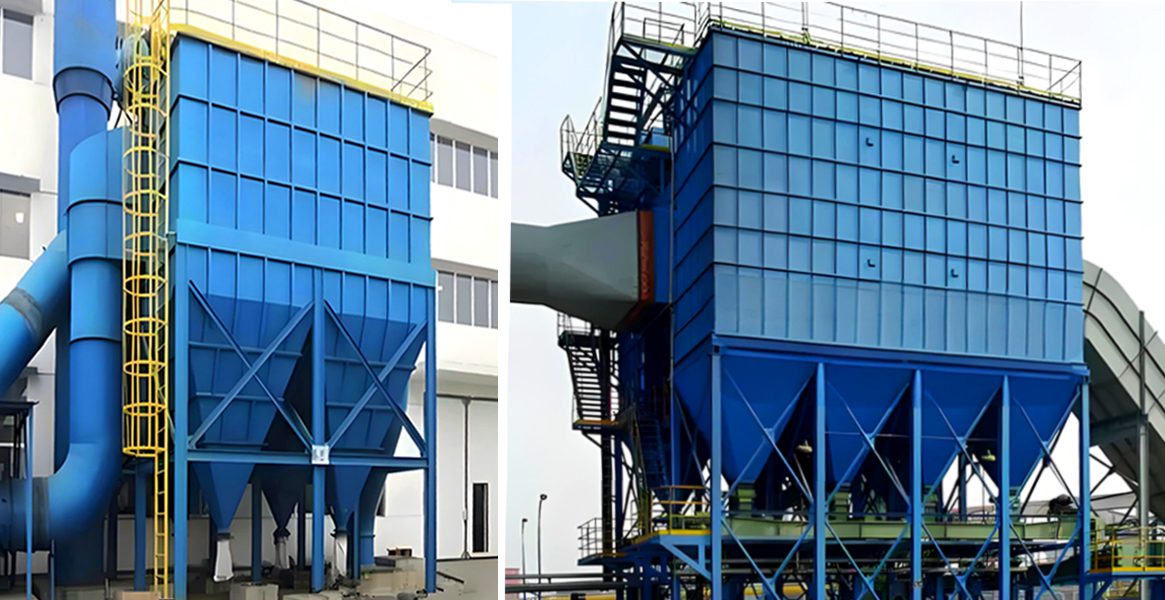Boiler dust collector is key industrial equipment used in various boiler systems. Their main function is to filter and capture particulate matter from flue gases. This process effectively removes dust and improves emission quality, enhancing air quality and aiding environmental protection.
Why Modern Boilers Require Advanced Dust Collection
Today’s industrial boiler dust collectors (commonly called baghouses or bag filters) are critical for achieving >99.9% particulate removal efficiency, ensuring compliance with EPA, EU IED, and China’s Ultra-Low Emission standards. These systems handle:
✔ Coal-fired boilers (pulverized coal/stoker-fired)
✔ Biomass boiler emissions (high-moisture flue gas)
✔ Waste-to-energy plants (corrosive gas streams)
6 Critical Factors for Selecting Boiler Dust Collectors
1. Boiler Specifications Analysis
Coal boilers: Match filter media to coal type (e.g., PPS+PTFE bags for high-sulfur coal)
Biomass boilers: Require hydrophobic filter bags (e.g., polyester with nanofiber layer)
Rated capacity: Size baghouse for peak flue gas volume +20% margin
2. Emission Compliance Requirements
| Region | PM Standard | Key Regulation |
|---|---|---|
| USA | ≤10 mg/Nm³ | EPA Subpart Db |
| EU | ≤5 mg/Nm³ | BREF LCP 2017 |
| China | ≤10 mg/Nm³ | GB 13271-202X |
3. Dust Property Considerations
| Dust Type | Particle Size | Recommended Solution |
|---|---|---|
| Coal fly ash | 0.1-50µm | Pulse-jet cleaning + PTFE membrane bags |
| Biomass ash | 1-200µm | Offline compartment cleaning |
| Lime dust | <5µm | Pre-coating system |
4. Process Integration Tips
Optimal location: Install after air preheater (120-180°C ideal for baghouses)
Ductwork design: Maintain 15-20 m/s velocity to prevent ash deposition
5. Climate Adaptation Features
Arctic sites: Heated enclosures + siliconized filter bags
Tropical plants: Anti-hydrolysis media + condensation sensors
6. Special Hazard Solutions
Explosive dusts: NFPA-compliant explosion vents + conductive bags
Acidic gases: Fluoropolymer-coated cages + chemical pre-treatment

How Baghouse Dust Collectors Work
Gas Inlet: Flue gas enters through flow distribution baffles
Filtration: Particles captured on filter bags (efficiency down to 0.3µm)
Cleaning: 0.5-0.7MPa pulse jets dislodge dust cake
Discharge: Ash falls to rotary valve for sealed removal
Technical Advantages:
✓ 260°C continuous operation (glass fiber bags)
✓ <500Pa pressure drop with optimized pulse sequencing
✓ 5+ year bag life with proper pre-coating
FAQ Section
Q: How often replace boiler filter bags?
A: Typically 3-5 years depending on:
• Gas temperature (<160°C ideal)
• Cleaning frequency (optimize pulse interval)
Q: Baghouse vs ESP for boilers?
A: Baghouses better for:
• Submicron particles
• High resistivity dust (>10¹⁰ Ω·cm)
• Variable load conditions
Q: Reducing maintenance costs?
A: Implement:
✔ Differential pressure monitoring
✔ Automatic damper controls
✔ Predictive maintenance sensors
Conclusion
In summary, when selecting a boiler baghouse dust collector, consider various factors to ensure the equipment’s performance and reliability. Make sure it meets environmental requirements. With the right selection and configuration, boiler bag filter can effectively improve emission quality and protect our environment.
Darko looks forward to providing you with professional solutions for boiler dust collectors! For more information or inquiries, please feel free to contact us!

